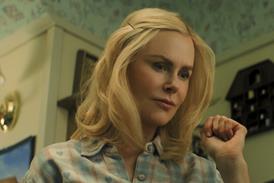The 70th Venice film festival combines an impressive selection of titles and a growing market - along with a few surprises. Andreas Wiseman reports.
“This is a great edition,” beams Venice artistic director Alberto Barbera, who is now into the second year of his second stint in charge of the world’s oldest film festival.
“We had a record number of submissions - 10% more than last year - and the general quality has improved.”
Barbera’s enthusiasm for the festival’s 70th anniversary line-up is understandable, with the selection including new films from Stephen Frears, Terry Gilliam, Hayao Miyazaki, Errol Morris, Kelly Reichardt, Kim Ki-duk, Andrzej Wajda, Alex Gibney, Lukas Moodysson and Alfonso Cuaron, whose Gravity starring George Clooney and Sandra Bullock opens the festival. Some 53 of the 55 films are world premieres.
“I think there are some unexpected aspects,” says Barbera, who also programmed Venice from 1998-2002. “Having two documentaries [Errol Morris’s The Unknown Known and Gianfranco Rosi’s Sacro GRA] in the main competition is very unusual, for example. There are also a number of first-time film-makers.”
The US and the UK are also well represented. “I was surprised by the quality of the films I saw in London,” says the executive after last year’s near shut out for the territory. “There could have been even more UK films included. It really is an impressive and unusually strong year for UK films.”
There are 21 Italian productions and co-productions in the selection, including a return to competition for veteran director and Venice favourite Gianni Amelio, and the first feature from acclaimed theatre director Emma Dante, also in competition.
“I am happy with the quality of Italian films on show. We have a lot of problems in the Italian industry concerning its weakness and a lack of funding but at the same time there is something happening - new talents are emerging with new subjects unconnected to established themes such as politics and established genres such as comedy.”
To mark the festival’s anniversary, Barbera has introduced Venezia 70: Future Reloaded, a strand showcasing 70 short films from renowned directors. Confirmed participants include international jury chair Bernardo Bertolucci and Orizzonti jury president Paul Schrader, as well as Shekhar Kapur, Apichatpong Weerasethakul, Abbas Kiarostami, Monte Hellman and Walter Salles.
‘We have problems in the Italian industry but at the same time there is something happening - new talents are emerging’
Alberto Barbera, Venice Film Festival
The festival has also initiated a Grand Jury prize after confusion last year when jurors had reportedly wanted to award the Golden Lion, best director prize and a joint best actor award to Paul Thomas Anderson’s The Master, only to be overruled due to the festival’s one-award-per-film policy. While the policy still stands, the Grand Jury, best director and best screenplay prizewinners may now also take an acting award “in exceptional circumstances and after consultation with the festival director”.
Industry initiatives
Last year saw the launch of a number of initiatives designed to modernise the festival and make it more industry facing. Returning schemes include the day-and-date online screening of selected films in the Orizzonti strand, a second edition of the Biennale College, which sees new film-makers mentored to produce micro-budget films, and an expanded industry market.
Market director Pascal Diot has been busily growing Venice’s industry offering: “Feedback was really good from the first year,” says former sales executive Diot, also in his second year at the helm. “Last year we had trade accreditation of 1,100 professionals. This year we’re hoping for at least 1,500 or more.”
In 2013, the market will take place over six days rather than five (August 29-September 3), which still allows distributors time to attend both the Venice market and Toronto.
Diot will once again welcome around 60 distributors, but this year he has also invited 40 producers who will have meetings with representatives from a larger number of film commissions than in previous years, and attend producer-oriented panels.
Industry will benefit from three new screening rooms - in addition to the video library - with seating capacities of 15, 50 and 100, while sales companies will meet with members of arthouse cinema association CICAE, which is holding its annual workshop during the festival.
There is also an African works-in-progress strand and a bespoke market app, and industry attendees will be able to unwind at a new happy-hour event.
In tough economic times, however, Diot and Barbera are aware Venice can be prohibitively expensive, and are keen to stress organisers have been negotiating cheaper hotel and apartment rates.
























No comments yet